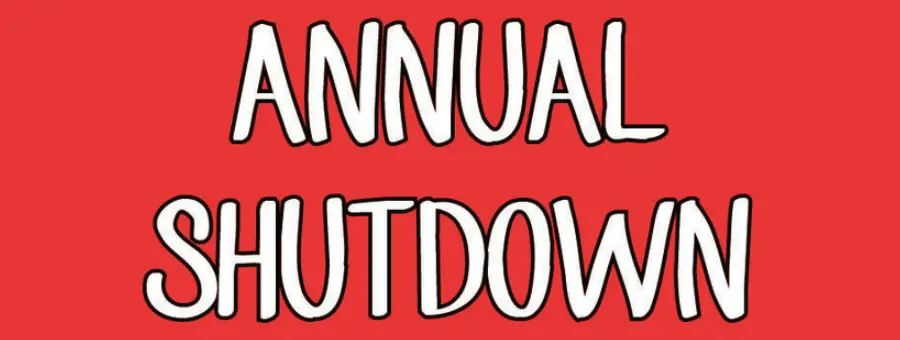
It is coming to that time of year again where Christmas is just around the corner and the New Year follows shortly thereafter. While it is commonly a time for celebration and an annual vacation, it can be a complex time for you and where the guidance of your bookkeeper can be of great value.The information provided in this article is general in nature, and you should check with a specialist HR service or with your bookkeeper if they are associated with a professional HR advisory service for specific advice.
There are many aspects to take into consideration and these will be covered:
- Part 1 (this article) – The Annual Shut-Down Guide
- Shut-Down Payments
- Public Holidays
- House Keeping
- Part 2 (Next month) – The Annual Christmas Guide
- Bonus payments
- Gifts and Christmas Parties / FBT
- Christmas Pay Checklist
The complexity comes when working with varying Awards or working conditions and when you have a mix of people going on leave, some remaining at work, some that have no leave, and those that want to work but cannot.
What is a Shut-Down?
A shut-down, according to Fair Work, is when a business closes or slows down its operation to a skeleton staff during a specific period. The reasons may be that it is not viable for the business to be operating during this period because it may be a quiet time or many staff are away on leave.
Know Your Award
Whilst it is possible that you may already be across the Awards for the employees, it is good practice to refer to the specific conditions that apply to a shutdown, such as during Christmas. The conditions can vary for each Award, industry and state. This will impact on leave entitlements and other contributing factors.
Should the employees be covered by a registered agreement, then check the terms that relate to a shut-down and/or the Christmas break. Registered agreements are recorded on and available from the Fair Work Commission website. (Your bookkeeper can help you with this.)
Shut-Down Payments
All full-time and part-time employees must be paid during this period. It is to be treated as leave. Casuals are not paid during this time given that no work is undertaken.
Depending on the type of Award or Agreement, it may or may not outline if an employee can be advised that they “must take leave” during the shut-down. The Award might indicate that the employer may request the employee take leave.
When nothing is stated in the Award or the Agreement, then the employee cannot be forced to use their leave, or be forced to take unpaid leave. Typically, you may be able to negotiate a favourable arrangement to both parties, such as partial paid and unpaid leave.
It is imperative that all terms and conditions relating to the employee’s contract are adhered to during the shut-down.
Refer to the relevant Award or Agreement in the event that there is not enough leave accrued to cover the shut-down period. Some Awards state that the employee will receive unpaid leave during the period; whereas others are able to take paid leave in advance. In the event that the employee does not agree to take unpaid leave or leave in advance, the employee is entitled to be paid their usual wages.
Check these issues with your bookkeeper if they are associated with a specialist HR advisory service as is ABBS (Many professional bookkeepers can provide this).
Public Holidays
When public holidays fall during an employee’s leave, these are to be treated as public holidays and not as annual leave – it is treated as though they would have worked that day should they not have been on leave. The public holiday pay should not affect their leave accrual, and simply be paid as another working day.
An example of what can occur:
Mary is a full-time employee who has put in leave for the duration of 7 days.
This includes Anzac Day, which is a public holiday and falls on a Thursday.
Because Mary is a full-time employee, Mary would need to be paid for Anzac Day.
This means that Mary is only taking 6 days of annual leave, not 7.
When an employee takes sick leave on either side of a public holiday, they are still entitled to be paid for the public holiday as though they would have been at work that day. The usual sick leave process applies unless there is any evidence that demonstrates otherwise.
An exception would be where the employee has been rostered to work on a public holiday, and this is not a day that they would usually work. If they were to then call in sick, the employee would not be paid for that day. Additionally, should the employee be on unpaid leave, then there will be no payment made for the public holiday. Your bookkeeper can assist you with this.
Working on Public Holidays
All employees receive their base pay for hours worked on a public holiday.
The varying entitlements are included in the Awards or Agreements for every employee, including how public holidays will impact the employee’s pay.
Some of the entitlements which need to be considered:
- Additional pay; i.e. public holiday rates
- Extra day off or annual leave
- Minimum shift lengths on public holidays
- Any agreements made as a substitute for another day for the public holiday
Employees cannot be forced to work on a public holiday. However, an employer can make this request if it is reasonable to the type of employment. Equally, the employee can refuse to do so when it is based on reasonable circumstances.
To understand what is deemed “reasonable”:
- Circumstances for the employee that are personal; i.e. family responsibilities
- The amount of pay and whether there is any increase; i.e. penalty rates.
- The type of work undertaken as well as the needs of the business
- Whether the employee’s agreement entails working on public holidays
- The type of employment status of the employee – full-time, part-time, casual or shift work
- The amount of notice provided to either party
The collective circumstances of the employee need to be considered prior to requesting for the employee to work on a public holiday. Seek the assistance of your bookkeeper.
Not Working on Public Holidays
With the exception of casual employees, employees that would normally work on a specific day that the public holiday has occurred are to be paid their usual base rate in conjunction with their ordinary hours that they would have worked.
The base rate does not include:
- Penalty rates
- Loadings
- Overtime
- Monetary allowances
- Bonuses or any incentive-based payments
Please note that it is unacceptable to change an employee’s day of work to avoid making this payment.
An example of this would be:
Steven is a part-time employee that works from Tuesdays to Thursday.
This year Boxing Day fell on a Monday.
Because Steven does not typically work Mondays, he will not be paid for this holiday.
House Keeping
- Notification to all employees of the employer’s intention to shut-down, and the planned dates of the shut-down.
- Appropriate forms and information received from the employees to confirm days on leave, and the confirmed intention of each employee.
- Calculation of days that each employee will not be present at work and is entitled to leave.
- Note how many public holidays there are during the shut-down period.
- Be across any employees that will be working during the shutdown period or on a public holiday, including any relevant penalty rates or changes to the rate of pay for any employee.
- Confirm if leave is to be paid during a normal pay cycle, before Christmas, or when the shut-down is to occur.
- Is there a pay run during the shutdown and if so, what are the implications (if any)?
- Give yourself enough time to prepare the pay run, as often in preparation for an annual shut-down it will take longer than usual to process the pay run.
Your bookkeeper will be able to assist you with these tasks and know where to check any issues that may need further clarification on your own specific situation.
Previous Newsletter Articles
Business Tips
HR Information
Contact Us
1300 022 270
enquiries@myabbs.com.au






